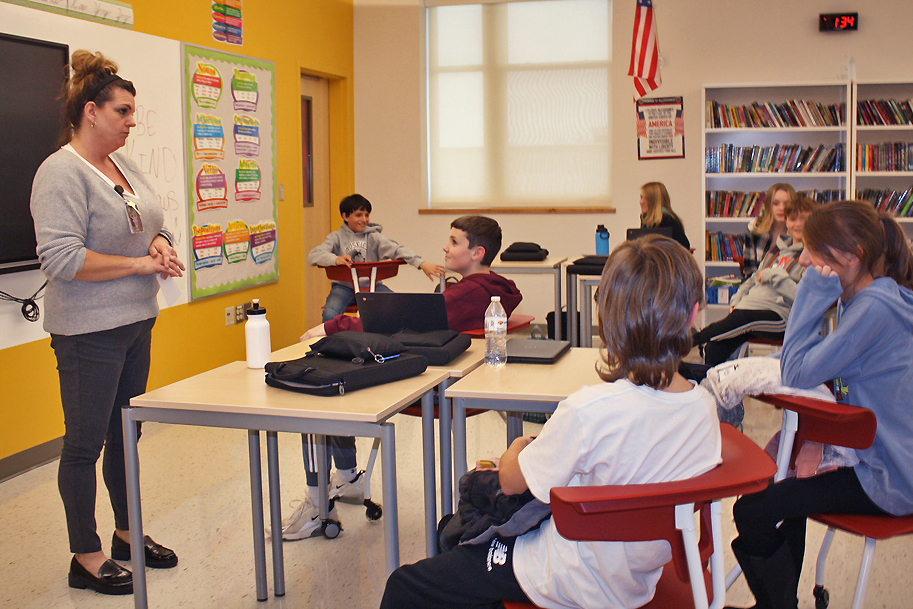
Tanya Stubbs, a new social worker at Caribou Community Schools, will lead a discussion about self-esteem with seventh graders in 2022. (Melissa Risotto | Aroostook Republican)
If you are experiencing a mental health crisis, call the Maine Crisis Hotline at 888-568-1112.
When Michael McCormick of Caribou sought treatment for his bipolar disorder, he didn't think he'd have to travel 275 miles to find it.
Remote Aroostook County doesn't have enough health care providers, leading to long wait times for treatment. McCormick was placed on a waiting list with no results. Despondent, he visited his primary care provider, who helped him administer medication and arranged for a successful treatment, but he had to travel to Northern Lights Acadia Hospital in Bangor.
The after-effects of the pandemic, homelessness and addiction have increased mental health needs across the state, calling for more crisis intervention and psychiatrists. But Aroostook County has unique obstacles to be aware of. Residents of small rural towns often have to travel to larger communities or outside of their area. Few providers come north. Additionally, there are gaps in Internet service, so online help may not be an option.
McCormick, who has been dealing with bipolar disorder for about 10 years, said it's difficult to be told your appointment is six months to a year away.
“Six months, even two months is a long time,” he says. “[Providers] I really want to help, but I think it's a matter of the proportion of people who are sick and the amount of service providers available to help them. ”
A lack of support in Aroostook County can have tragic consequences, as it did for Jacob Poitreau and Jacob Wood. Both men were experiencing symptoms of mental illness at the time they were shot and killed by police. Poitreau's mother blamed a flawed system.
The U.S. Department of Health and Human Services says Fort Kent, Caribou and Presque Isle are “high need” areas with a shortage of mental health professionals. The 2022 Maine Regional Health Needs Assessment lists mental health as Aroostook County's top priority, with a shortage of health care providers and long waiting lists top of the concerns.
“The missing resource for us is clinicians,” said Esther Seal, clinical director of Northern Maine General in Eagle Lake, a nonprofit social services organization. “Even though more people are leaving and fewer people are joining us, mental health needs and referrals are still increasing.”
Northern Maine General, which provides outpatient mental health and residential care, has a waiting list of 60 people. Mr. Shea said he receives two to five new requests every week, but he won't be able to accept more referrals without increasing his staff.
According to the National Alliance on Mental Illness, mental illness includes depression, anxiety, bipolar disorder, post-traumatic stress, and many other conditions. Nationally, one in five adults and one in six young people aged 6 to 17 experience a mental illness each year, and fewer than half receive care. .
According to data from the coalition, 223,000 adults in Maine had a mental health condition as of February 2021. Of these, 65,000 were unable to receive treatment.
Telemedicine appointments are difficult to make in rural areas due to the lack of providers and internet capabilities. In fact, nearly a quarter of her households in Aroostook do not have a reliable broadband connection.
Someone must answer the call for help before the provider gets involved. School counselors and law enforcement officers are front-line responders, and they are in high demand.
“Over the past five years, I've seen at least a 50 to 75 percent increase in mental health problems among children. There is clearly a mental health crisis,” said Dr. Counselor Colin Matthews said.
Matthews visits more than 30 children each week. Five years ago, she was seeing maybe 15 students a week, she said.
Matthews said students are still grappling with the fear and anxiety of the pandemic, and many are facing poverty and unstable home situations that prevent them from succeeding.
Pediatricians often call her to see students until the waiting list is exhausted.
“We've lost about half of our providers in the Halton area alone. Some agencies have gone out of business. We've lost some clinicians,” Matthews said. “They don't have enough people to meet the needs of the community.”
Alison Reed, guidance director at SAD 1 in Presque Isle, said the mental health needs of students have skyrocketed due to COVID-19.

Although each student's situation is different, the disruption of normal routines, social isolation, family stress, and adjusting to distance learning have all contributed to anxiety and depression. Their impact is not over yet.
“The effects of coronavirus will continue to be felt for many years to come,” she said.
The Presque Isle Police Department handled more than 1,041 mental health-related cases in 2023, a 20% increase from 2022 and four times the pre-pandemic average, according to Chief Chris Hayes.
She said Maine doesn't have enough health care providers or locations to refer people, and most facilities have limited staff for short-term care.
“As we are on the front lines of law enforcement, we need to continue to respond to mental health calls and continue to provide assistance in any way we can,” Hayes said. “But because we are not trained professionals in mental health, we feel like we are not accomplishing anything.”
Fort Kent Police Chief Michael Delena reported 31 incidents involving mental health in 2023. He said the influx is largely due to the opioid crisis and a combination of illicit drug use and mental health conditions.
“This often leads to psychosis and is difficult for law enforcement officers to deal with,” Delena said.
According to Fort Fairfield Police, mental health caseloads increased by 50% from 2,124 cases in 2022 to 3,383 cases in 2023. Too few health care workers, a rise in substance use disorders, and homelessness are contributing factors.
Improving conditions for county residents with mental health issues will require a community effort, experts said.
Presque Isle police are currently working with social workers on some calls, as some Midcoast police departments are doing. The department also purchased a therapy dog to help children and others at the police station.
Shea said the county needs to rebuild the sense of community it had before the coronavirus made people isolated and afraid to gather.
“We need to find ways to make people feel connected again,” she said.
Matthews, of Holton Middle School, said people need affordable housing. Inflation has made it difficult for families to pay rent, utilities, and food.
McCormick, who also struggles with addiction and lives at the Recovery Aroostook home in Caribou, said a facility like Acadia Hospital would be a huge addition to the county. He is open about his struggles and successes. Because he wants people to know it's okay to ask for help.
SAD 1's Reid said school and district counselors need to work together to help people understand that.
“We need to reduce the stigma surrounding mental health,” she said. “We need to focus on the fact that asking for help is a sign of strength, not weakness.”


